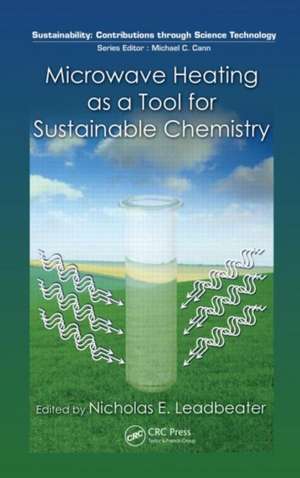Microwave Heating as a Tool for Sustainable Chemistry: Sustainability: Contributions through Science and Technology
Editat de Nicholas E. Leadbeateren Limba Engleză Hardback – 2 sep 2010
From organic chemistry to materials and biological applications
The book begins with an introduction to microwave heating, the physical concepts behind it, its application in synthetic chemistry, and commercially available microwave equipment. It shows how microwave heating can be used to facilitate the clean and sustainable synthesis of organic compounds. The authors examine microwave heating as a tool for sustainable polymer chemistry, with discussions of the use of alternative solvents and feedstocks, the design of degradable polymeric materials, and recycling polymers. They then discuss the significant contribution made by microwave-promoted synthesis in the drug discovery process, with a focus on how the technology has been used to generate discovery chemistry libraries and as a tool for medicinal chemists. Other topics examined in this application-driven text include the use of microwave heating in the preparation of inorganic and organometallic compounds, in the production of inorganic materials, and in the area of biosciences.
Academic and industrial settings
The book examines the scale-up of microwave-promoted chemistry and describes the various approaches and the current commercially available microwave reactors available for scale-up. It also discusses microwave heating as a tool for teaching in the undergraduate organic chemistry laboratory. It explores curriculum, the broad range of reactions that can be performed, and the incorporation of green chemistry principles.
The author maintains a website with supplemental information.
| Toate formatele și edițiile | Preț | Express |
|---|---|---|
| Paperback (1) | 427.84 lei 6-8 săpt. | |
| CRC Press – 22 mai 2017 | 427.84 lei 6-8 săpt. | |
| Hardback (1) | 1102.83 lei 6-8 săpt. | |
| CRC Press – 2 sep 2010 | 1102.83 lei 6-8 săpt. |
Preț: 1102.83 lei
Preț vechi: 1482.29 lei
-26% Nou
211.05€ • 219.00$ • 176.40£
Carte tipărită la comandă
Livrare economică 15-29 martie
Specificații
ISBN-10: 1439812691
Pagini: 290
Ilustrații: 215 b/w images, 7 tables and 62 figures and Schemes 153
Dimensiuni: 156 x 234 x 20 mm
Greutate: 0.71 kg
Ediția:1
Editura: CRC Press
Colecția CRC Press
Seria Sustainability: Contributions through Science and Technology
Locul publicării:Boca Raton, United States
Public țintă
Organic chemists and chemical engineers and graduate students in organic chemistry, polymer chemistry and processing, material science, biomedical engineering, and environmental studies.Cuprins
Microwave Heating as a Tool for Sustainable Chemistry: An Introduction, Jason R. Schmink and Nicholas E. Leadbeater
Microwave Heating
Microwave Effects
Microwave-Assisted Synthesis
Commercially Available Microwave Equipment
Microwave Heating as a Tool for Organic Synthesis, Robert A. Stockland, Jr.
Solvent-Free Reactions
Reactions Using Organic Solvents
Reactions in Water
Asymmetric Transformations
Microwave Heating as a Tool for Sustainable Polymer Chemistry, Mauro Iannelli
Use of Alternative Solvents
Use of Alternative Feedstocks
Design of Degradable Polymeric Materials
Recycling Polymers
Microwave Heating as a Tool for Drug Discovery, Ping Cao and Nicholas E. Leadbeater
Microwave-Based Synthetic Methodologies for Generation of Discovery Chemistry Libraries
Microwave-Assisted Medicinal Chemistry
Microwave Heating as a Tool for Process Chemistry, Jonathan D. Moseley
Scale-Up
Commercially Available Microwave Apparatus
Practical Considerations
Examples of Scale-Up
Other Applications in Process Chemistry
Energy Efficiency of Microwave Heating
Recent Developments in Scale-Up
Microwave Heating as a Tool for the Undergraduate Organic Chemistry Laboratory, Cynthia B. McGowan and Nicholas E. Leadbeater
Motivation for Incorporation of Microwave Heating as a Tool in the Undergraduate Laboratory
Examples of Published Teaching Materials Incorporating Microwave Heating into the Undergraduate Laboratory
Microwave Heating as a Tool for Inorganic and Organometallic Synthesis, Gregory L. Powell
Microwave-Promoted Coordination Chemistry
Microwave-Promoted Organometallic Chemistry
Microwave Heating as a Tool for Materials Chemistry, Steven L. Suib and Nicholas E. Leadbeater
Microwave Heating for Preparation of Adsorbents
Microwave Heating for Preparation of Battery Materials
Microwave Heating for Preparation of Ceramics
Microwave Heating for Preparation of Zeolite Materials
Examples of Other Materials Prepared Using Microwave Heating
Microwave Heating as a Tool for the Biosciences, Grace S. Vanier
Synthesis of Peptides
Synthesis of Modified Peptides
Microwave-Assisted Proteomics
Other Bioscience Applications of Microwave Heating
Future Perspectives
Index
Recenzii
— Trevor Laird, Editor, Organic Process Research & Development
This book is a useful complement to literature reviews and other books on the topic. For those who are interested in green and sustainable chemistry, it is well worth reading.
—Wei Zhang, University of Massachusetts, Boston, in Journal of the American Chemical Society
"Overall this book covers many areas which utilise microwave heating technology to enhance one or many aspects of chemical transformations. The text is best suited to postgraduate students and academics with an interest in synthetic methodology and serves as an excellent starting point to flesh out ideas potentially applicable to microwave irradiation. Well worth a read and an excellent addition to any professional library."
—Luke C Henderson, Reviews, July 2011, No. 22, Vol 12
… valuable for process chemists and should be read by all those thinking about scaling up a microwave reaction or purchasing equipment.
— Trevor Laird, Editor, Organic Process Research & Development
This book is a useful complement to literature reviews and other books on the topic. For those who are interested in green and sustainable chemistry, it is well worth reading.
—Wei Zhang, University of Massachusetts, Boston, in Journal of the American Chemical Society
Descriere
Shorter reaction times, higher product yields, and enhanced selectivity are some of the advantages microwave heating has over conventional methods, causing its use to transition from a curiosity to mainstream, both in industrial and academic settings. Microwave Heating as a Tool for Sustainable Chemistry showcases the application of microwave heating in a number of areas of preparative chemistry as well as in the biosciences.
From organic chemistry to materials and biological applications
The book begins with an introduction to microwave heating, the physical concepts behind it, its application in synthetic chemistry, and commercially available microwave equipment. It shows how microwave heating can be used to facilitate the clean and sustainable synthesis of organic compounds. The authors examine microwave heating as a tool for sustainable polymer chemistry, with discussions of the use of alternative solvents and feedstocks, the design of degradable polymeric materials, and recycling polymers. They then discuss the significant contribution made by microwave-promoted synthesis in the drug discovery process, with a focus on how the technology has been used to generate discovery chemistry libraries and as a tool for medicinal chemists. Other topics examined in this application-driven text include the use of microwave heating in the preparation of inorganic and organometallic compounds, in the production of inorganic materials, and in the area of biosciences.
Academic and industrial settings
The book examines the scale-up of microwave-promoted chemistry and describes the various approaches and the current commercially available microwave reactors available for scale-up. It also discusses microwave heating as a tool for teaching in the undergraduate organic chemistry laboratory. It explores curriculum, the broad range of reactions that can be performed, and the incorporation of green chemistry principles.
The author maintains a website with supplemental information.





























